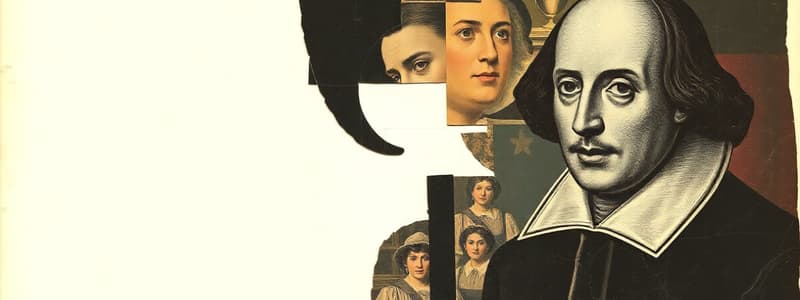Podcast
Questions and Answers
What does Lady Macbeth mean by 'Nought's had, all's spent, Where our desire is got without content'?
What does Lady Macbeth mean by 'Nought's had, all's spent, Where our desire is got without content'?
- Their desires have brought them peace.
- They have lost everything in pursuit of their desires.
- They have gained everything they wanted.
- They have achieved their goals, but remain unsatisfied. (correct)
What metaphor does Macbeth use to describe their current situation?
What metaphor does Macbeth use to describe their current situation?
- They are buried alongside Duncan.
- They are flying with bats.
- They have scorched the snake. (correct)
- They have killed the snake.
What does Lady Macbeth suggest to Macbeth regarding the guests?
What does Lady Macbeth suggest to Macbeth regarding the guests?
- To act jovial and disguise their true feelings. (correct)
- To avoid the guests altogether.
- To confront Banquo openly.
- To share their thoughts on Duncan's murder.
Which phrase reflects Macbeth's mental unrest?
Which phrase reflects Macbeth's mental unrest?
How does Macbeth describe the peace of the dead?
How does Macbeth describe the peace of the dead?
What does Lady Macbeth mean when she says 'Gentle my lord, sleek o'er your rugged looks'?
What does Lady Macbeth mean when she says 'Gentle my lord, sleek o'er your rugged looks'?
What action does Macbeth plan to take against Banquo and Fleance?
What action does Macbeth plan to take against Banquo and Fleance?
What does Macbeth mean by asking Lady Macbeth to be 'innocent of the knowledge'?
What does Macbeth mean by asking Lady Macbeth to be 'innocent of the knowledge'?
Flashcards
Macbeth's fear of Banquo
Macbeth's fear of Banquo
Macbeth is deeply worried about Banquo, as he fears that Banquo's descendants will inherit the throne. His conscience is gnawed by the thought of Banquo and his future offspring taking over.
Lady Macbeth's advice to Macbeth
Lady Macbeth's advice to Macbeth
Lady Macbeth encourages Macbeth to act confidently and disguise his inner turmoil to hide his guilt and maintain appearances.
Macbeth's inner turmoil
Macbeth's inner turmoil
The play explores Macbeth's mental anguish. He is constantly haunted by guilt and feels trapped by a sense of foreboding due to the murder. There's a contrast between the image he wants to project and his true, tormented self.
Lady Macbeth's pragmatism
Lady Macbeth's pragmatism
Signup and view all the flashcards
Macbeth's plan to eliminate Banquo
Macbeth's plan to eliminate Banquo
Signup and view all the flashcards
The symbolism of night
The symbolism of night
Signup and view all the flashcards
Macbeth's desire for control
Macbeth's desire for control
Signup and view all the flashcards
Lady Macbeth's role in the play
Lady Macbeth's role in the play
Signup and view all the flashcards
Study Notes
Lady Macbeth's Concerns and Macbeth's Despair
- Banquo is still alive, a threat to Macbeth's power
- Lady Macbeth urges Macbeth to act, attempting to calm his despair
- Macbeth feels trapped by guilt and fear, haunted by Duncan's murder and the threat of Banquo
- Macbeth's remorse is evident, comparing the situation to a trapped serpent, and that further action is necessary to ensure safety
- Macbeth and Lady Macbeth plan to act against Banquo and are determined to continue their ambition
- Lady Macbeth's advice emphasizes outward appearance and hiding inner turmoil
Fears and Doubts
- Banquo and his son, Fleance, present a potent threat, as they are potential rivals to Macbeth's kingship
- Macbeth acknowledges Banquo's potential to become a threat to their new position of power
- Macbeth feels burdened by guilt, fearing punishment for Duncan's murder, and the fear of repeated treachery
- Macbeth expresses a desire to escape his guilt, wishing for peace and tranquility
- Macbeth's fears are shown through his use of violent imagery (e.g. 'scorched the snake')
- Macbeth worries about both their physical and mental health as a result of their actions
- Macbeth acknowledges that "what's done is done" but still fears the consequences.
- Their fears are intertwined. Their actions are entwined with doubts and guilt
- Lady Macbeth urges Macbeth to overcome his doubts and participate in their plot
- Macbeth's anxieties are reflected in his soliloquies and his conversations with Lady Macbeth.
Plans for Future Action
- Lady Macbeth encourages Macbeth to maintain a jovial facade during the evening, ensuring that Duncan's murderers aren't discovered
- Macbeth attempts to appear outwardly normal and composed, hiding their inner struggles and thoughts
- Macbeth's plan for Banquo is to be accomplished before the morning
- They are determined to eliminate Banquo and further their political positioning
- Macbeth and Lady Macbeth devise a new plan to rid themselves of remaining threats.
Studying That Suits You
Use AI to generate personalized quizzes and flashcards to suit your learning preferences.




